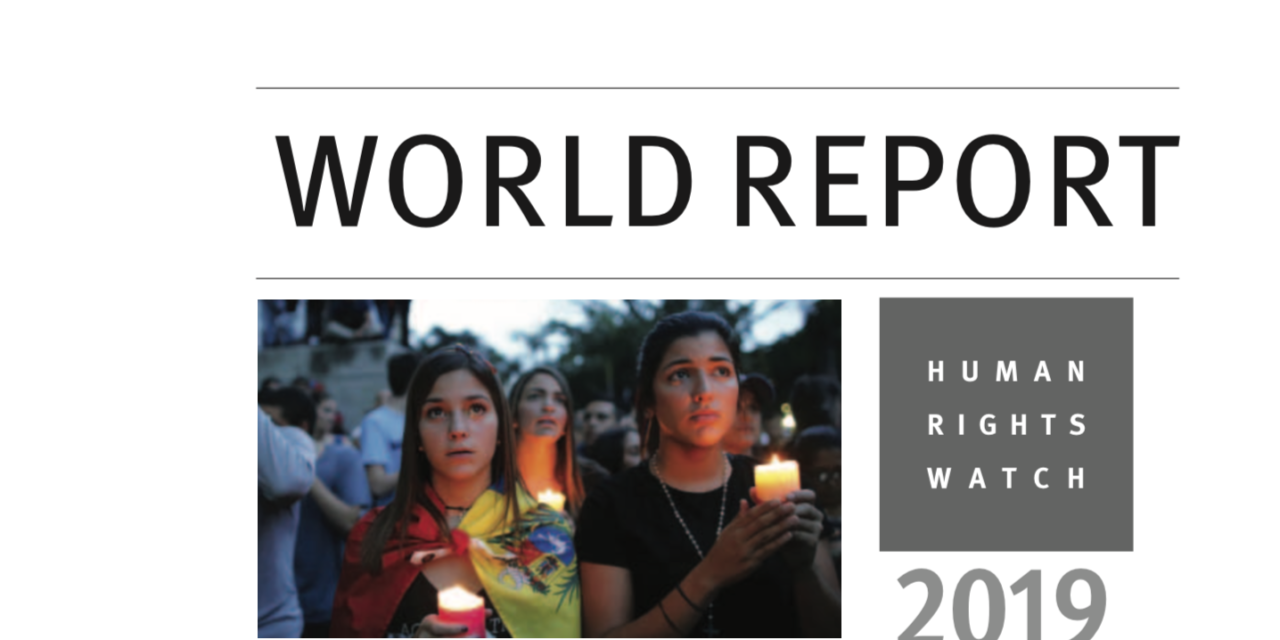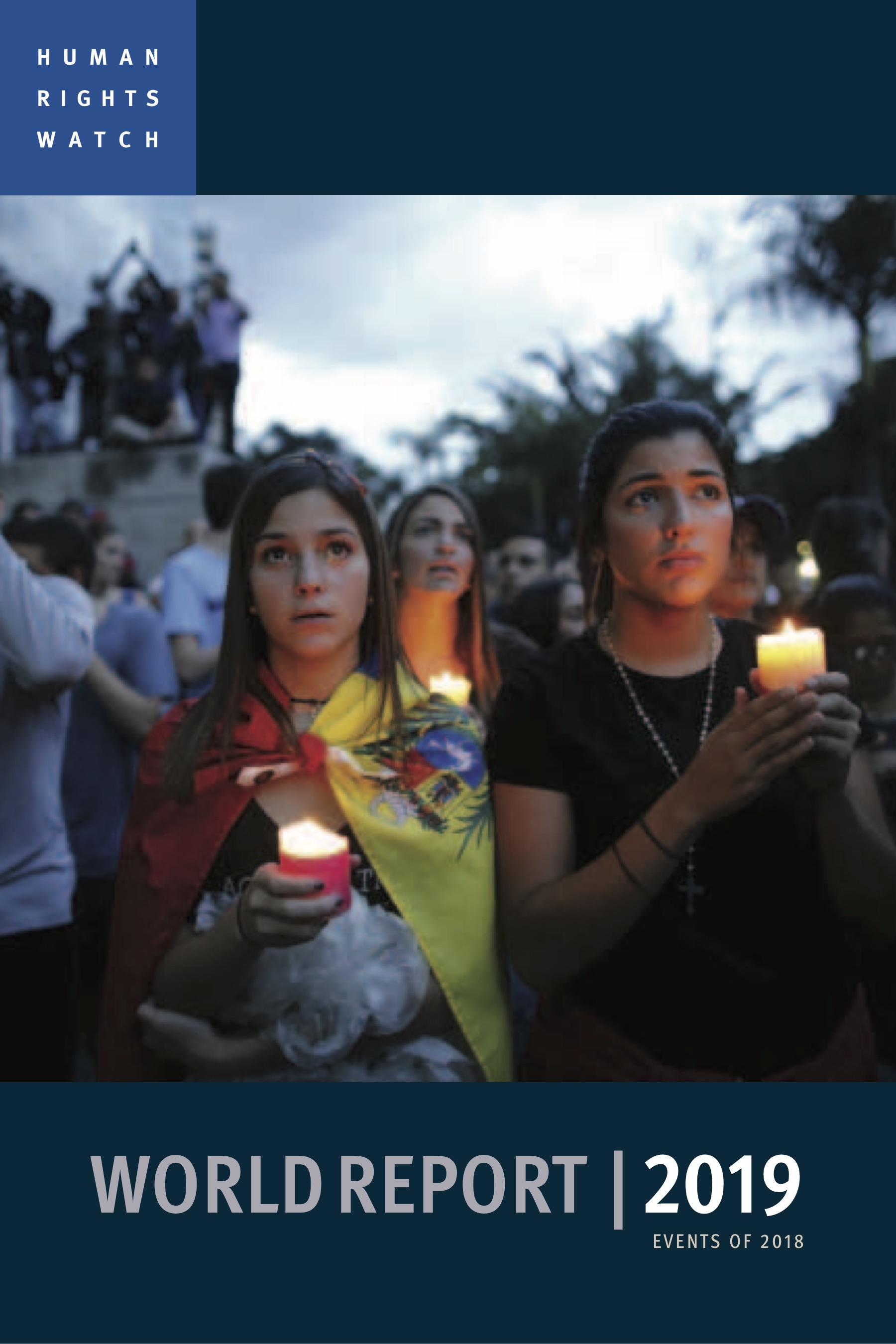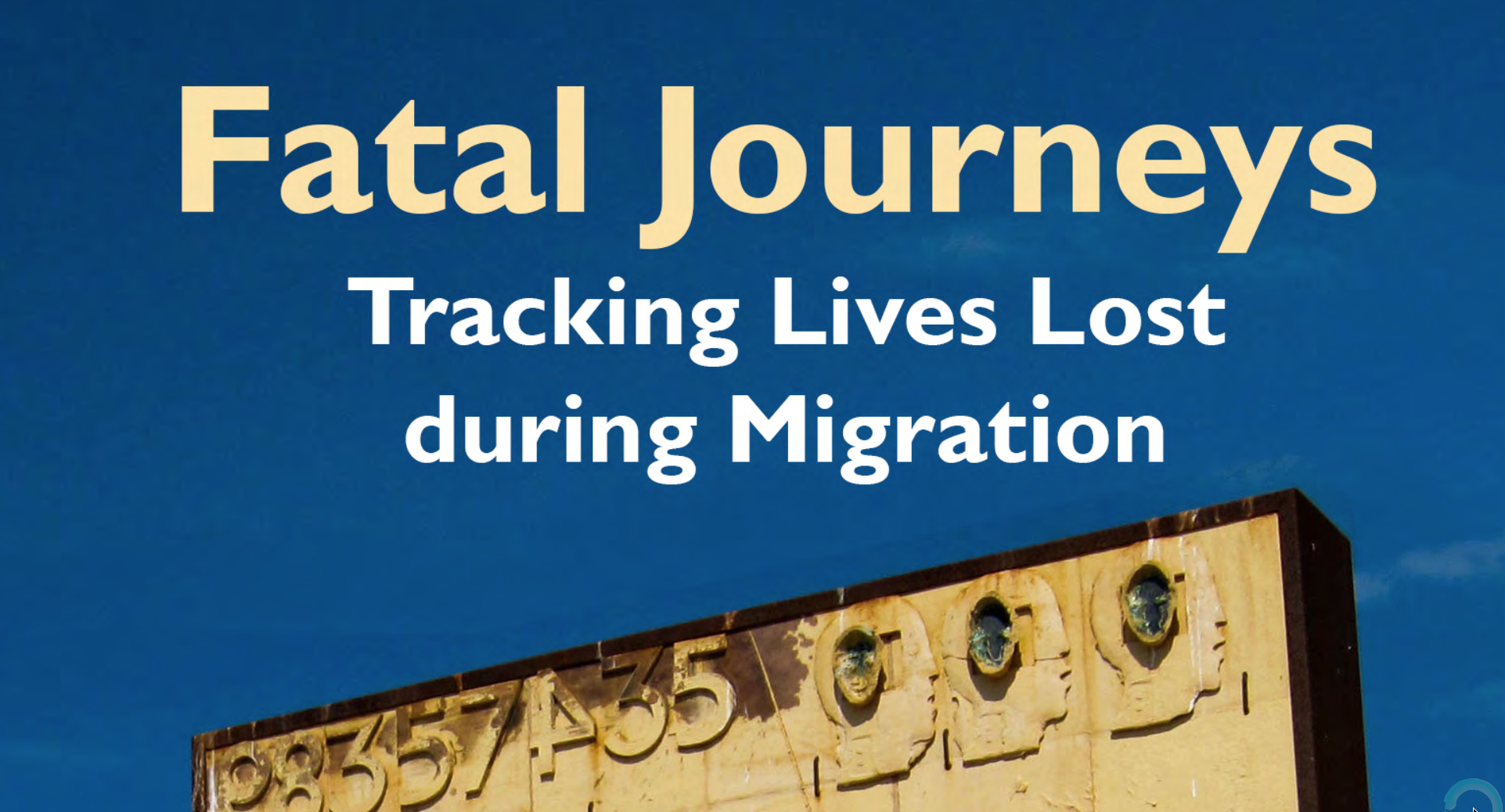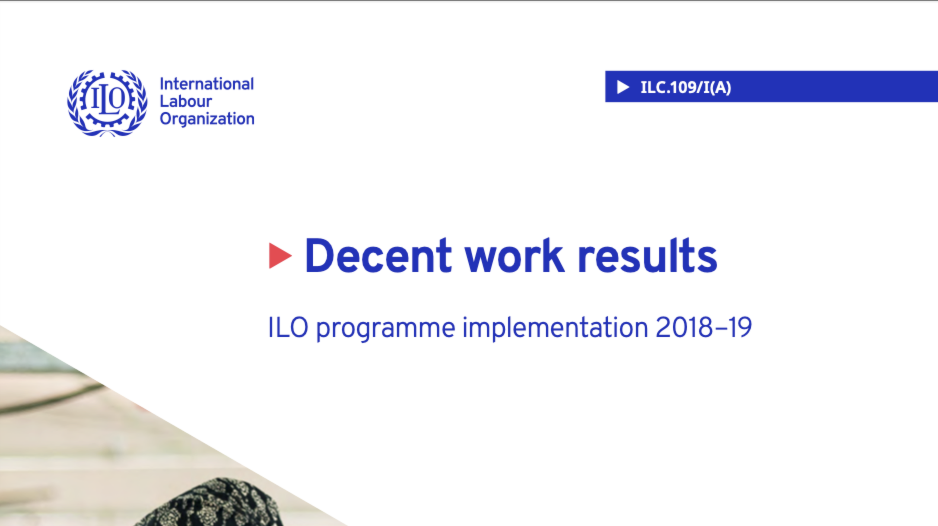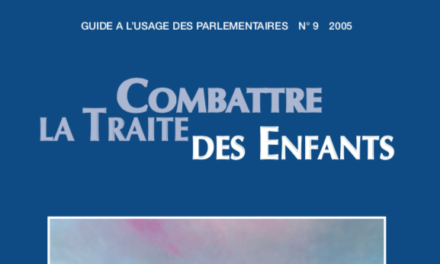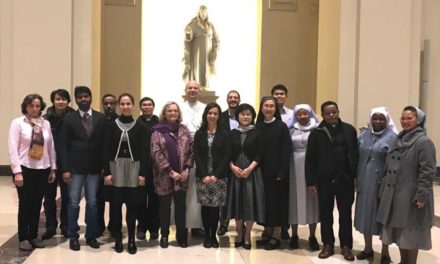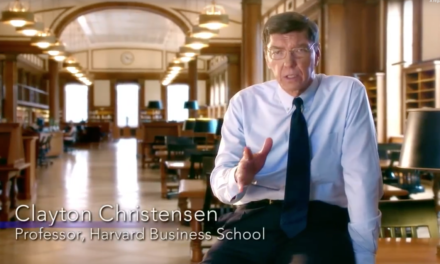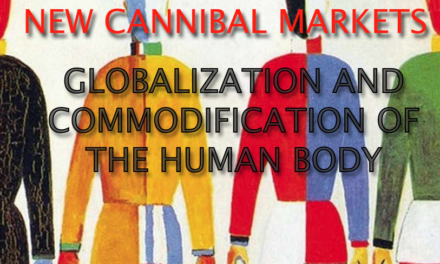INTRODUCTION TO THE 2019 REPORT
World’s Autocrats Face Rising Resistance
By Kenneth Roth, Executive Director, Human Rights Watch In some ways this is a dark time for human rights. Yet while the autocrats and rights abusers may capture the headlines, the defenders of human rights, democracy, and the rule of law are also gaining strength. The same populists who are spreading hatred and intolerance are spawning a resistance that keeps winning its share of battles. Victory in any given case is never assured, but it has occurred often enough in the past year to suggest that the excesses of autocratic rule are fueling a powerful counterattack. Unlike traditional dictators, today’s would-be autocrats typically emerge from democratic settings. Most pursue a two-step strategy for undermining democ- racy: first, scapegoat and demonize vulnerable minorities to build popular sup- port; then, weaken the checks and balances on government power needed to preserve human rights and the rule of law, such as an independent judiciary, a free media, and vigorous civic groups. Even the world’s established democracies have shown themselves vulnerable to this demagoguery and manipulation. Autocratic leaders rarely solve the problems that they cite to justify their rise to power, but they do create their own legacy of abuse. At home, the unaccountable government that they lead becomes prone to repression, corruption, and mis- management. Some claim that autocrats are better at getting things done, but as they prioritize perpetuating their own power, the human cost can be enormous, such as the hyperinflation and economic devastation in once oil-rich Venezuela, the spree of extrajudicial killings as part of the “drug war” in the Philippines, or China’s mass detention of upwards of 1 million Turkic Muslims, primarily Uyghurs. Because they dislike human rights scrutiny, autocratic leaders also tend to re- treat from the defense of human rights beyond their borders. This retrenchment has made it easier for brutal leaders to get away with large-scale atrocities, such as Syria’s war on civilians in areas held by anti-government forces, the Saudi-led coalition’s indiscriminate bombing and blockade that are killing and starving Yemeni civilians, and the Myanmar army’s mass murder, rape, and arson against Rohingya Muslims.
In response to these disturbing trends, new alliances of rights-respecting gov- ernments, often prompted and joined by civic groups and the public, have mounted an increasingly effective resistance. Political leaders decide to violate human rights because they see advantages, whether maintaining their grip on power, padding their bank accounts, or rewarding their cronies. This growing re- sistance has repeatedly raised the price of those abusive decisions. Because even abusive governments weigh costs and benefits, increasing the cost of abuse is the surest way to change their calculus of repression. Such pressure may not succeed immediately, but it has a proven record over the long term. Much of this pushback has played out at the United Nations—a noteworthy de- velopment because so many autocrats seek to weaken this multilateral institu- tion and undermine the international standards that it sets. The UN Human Rights Council, for example, took important—sometimes unprecedented—steps in the past year to increase pressure on Myanmar, Saudi Arabia, and Venezuela. The opponents of human rights enforcement, such as China, Russia, Egypt, and Saudi Arabia, traditionally carry considerable weight in these settings, so it was impressive to see how often they lost this past year. Given the recent reluctance of many large Western powers to promote human rights enforcement, the lead- ers of this resistance were often coalitions of smaller- and medium-sized states, including some non-traditional allies. Significant pressure in defense of rights was also asserted outside the UN. Within the past year, that included efforts to prevent a bloodbath in Syria, to re- sist autocratic trends in Europe, to defend the longstanding ban on chemical weapons, to convince an African president to accept constitutional limits on his reign, and to press for a full investigation into the murder of Saudi journalist Jamal Khashoggi. This mounting pressure illustrates the possibility of defending human rights—in- deed, the responsibility to do so—even in darker times. The promise of rights-re- specting democratic rule—of accountable governments that answer to the needs of their citizens rather than the power and wealth of high-level officials—remains a vital, mobilizing vision. The past year shows that battles in its defense remain very much worth waging.
The Dark Side of Autocratic Rule
Despite the mounting resistance, the forces of autocracy have been on the rise. For example, Brazil elected as president Jair Bolsonaro—a man who, at great risk to public safety, openly encourages the use of lethal force by the military and po- lice in a country already wracked by a sky-high rate of police killings and more than 60,000 homicides per year. Established autocrats and their admirers continued their disregard for basic rights. Turkey’s President Recep Tayyip Erdoğan and Egypt’s President Abdel Fat- tah al-Sisi persisted in silencing independent voices and civic groups and lock- ing up thousands for their presumed political views. Philippines President Rodrigo Duterte encouraged more summary executions, supposedly of drug sus- pects, but often of people guilty of no more than being poor young men. Hun- gary’s Prime Minister Viktor Orbán implemented his brand of “illiberal democracy.” Poland’s de facto ruler, Jarosław Kaczyński, sought to stack his country’s courts with his preferred judges, undermining the judiciary’s inde- pendence. Italy’s interior minister and deputy prime minister, Matteo Salvini, closed ports to refugees and migrants, scuttled efforts to save migrants’ lives at sea, and stoked anti-immigrant sentiment. India’s Prime Minister Narendra Modi failed to halt the demonizing of Muslims while attacking civic groups that criti- cized his rights record or environmental policies. The Cambodian prime minister, Hun Sen, tightened his grip on power by holding sham elections from which the opposition party was banned. US President Donald Trump disparaged immi- grants and minorities and tried to bully judges and journalists whom he deemed to stand in his way. Russia under President Vladimir Putin continued its multi- year crackdown on independent voices and political opposition. China closed off any possibility of organized opposition to the increasingly one-man rule of Xi Jin- ping. Beyond the immediate victims, some of the economic costs of autocratic rule be- came more visible over the course of the year. Oil-rich Venezuela once enjoyed one of Latin America’s highest standards of living but today, under the autocratic rule of President Nicolás Maduro, Venezuelans suffer severe shortages of food and medicine, causing millions to flee the country. President Erdogan, persisting with large-scale building projects that often benefited his allies, oversaw a plum- meting currency and a skyrocketing cost of living in Turkey. Mozambique discovered that $2 billion in government funds had disappeared from its treasury.
China’s much-touted “One Belt, One Road” initiative to develop trade infrastruc- ture fostered autocratic mismanagement in other countries. In keeping with Bei- jing’s longstanding practice, Belt and Road loans come with no visible conditions, making Beijing a preferred lender for autocrats. These unscrutinized infusions of cash made it easier for corrupt officials to pad their bank accounts while saddling their people with massive debt in the service of infrastructure projects that in several cases benefit China more than the people of the in- debted nation. In Malaysia, Prime Minister Mahathir bin Mohamad cancelled three major infra- structure projects financed by Chinese loans amid concerns that his predeces- sor, Najib Razak, had agreed to unfavorable terms to obtain funds to cover up a corruption scandal. Unable to afford its enormous debt burden, Sri Lanka was forced to surrender control of a port to China, built with Chinese loans but with- out an economic rationale in the home district of former President Mahinda Ra- japaksa. Kenya came to rue a Chinese-funded railroad that offered no promise of economic viability. Pakistan, Djibouti, Sierra Leone, and the Maldives all ex- pressed regret at having agreed to certain Chinese-funded projects. Talk of a Chi- nese “debt trap” became common.
The Pushback
The growing pushback against autocratic rule and the corruption it frequently fu- eled took various forms over the past year. Sometimes elections or public pres- sure were the vehicle. Malaysian voters ousted their corrupt prime minister, Najib Razak, and the ruling coalition in power for almost six decades, for a coali- tion running on an agenda of human rights reform. Maldives voters rejected their autocratic president, Yameen Abdulla Gayoom. In Armenia, whose government was mired in corruption, Prime Minister Serzh Sargsyan had to step down amid massive protests. Czech Prime Minister Andrej Babis faced growing protests against his alleged corruption. Ethiopia, under popular pressure, replaced a long-abusive government with a new one led by Prime Minister Abiy Ahmed, who embarked on an impressive reform agenda. US voters in the midterm elections for the House of Representatives seemed to rebuke President Trump’s divisive and rights-averse policies.
Sometimes independent institutions of government resisted the overreach of their country’s leaders. Poland’s independent judges refused to abandon their jobs in the face of Kaczyński’s efforts to purge them; the European Court of Jus- tice later backed their refusal. Guatemala’s Constitutional Court reversed Presi- dent Jimmy Morales’s attempt to bar from the country the chief investigator of a UN-backed anti-corruption body after it started probing his own alleged financial wrongdoing. US Chief Justice John Roberts, appointed by former President George W. Bush, publicly berated President Trump for disparaging “an Obama judge” who had ruled against Trump’s efforts to limit migrants’ right to seek asy- lum. In many cases, the public led the resistance in the streets. Large crowds in Bu- dapest protested Orbán’s moves to shut Central European University, an aca- demic bastion of liberal inquiry and thought. Tens of thousands of Poles repeatedly took to the streets to defend their courts from the ruling party’s at- tempts to undermine their independence. People across the United States and dozens of companies protested Trump’s forcible separation of immigrant chil- dren from their parents.
Multilateral Resistance
New governments had to pick up the defense of human rights because several important governments faltered. President Trump preferred to embrace autocrats whom he viewed as friendly, even if parts of the US government often tried to work around the White House. The British government, worried about Brexit, ap- peared willing to publicly advocate for human rights mainly in countries where British trade or commercial interests were limited. French President Emmanuel Macron defended democratic values rhetorically, but too often found reasons to avoid applying those principles when they implicated efforts to curb migration, fight terrorism, or secure commercial opportunities. Germany’s Chancellor An- gela Merkel spoke against anti-rights policies emanating from Moscow and Washington but was often beset by political challenges at home. China and Rus- sia did all they could to undermine global rights enforcement, while at home they imposed the most repressive rule in decades.
UN Human Rights Council
Against this challenging backdrop, a critical mass of human rights supporters has regularly risen to the occasion. The 47-member UN Human Rights Council was an especially important venue. It proved significant even though the Trump administration ordered the United States to withdraw from it—the first country ever to do so—in a failed effort to discredit the council’s regular criticism of Is- rael. Washington objected to the council’s focus on Israel, which occurs in part because many US administrations, including that of President Trump, use the US veto at the UN Security Council to shield Israel from any criticism there. The Human Rights Council has repeatedly taken important steps to defend rights in North Korea, Syria, Myanmar, Yemen, Sudan, South Sudan, Burundi, and the Democratic Republic of Congo—all countries with deeply problematic human rights records that the US government has long said it wants addressed. Yet President Trump was willing to jeopardize that in the name of weakening the council because it denounces such Israeli policies as the crippling closure of Gaza and the discriminatory and illegal settlement regime in the West Bank. The Human Rights Council made major advances despite—and in one case ar- guably because of—the US absence. For example, the possibility of a Chinese, Russian, or even American veto at the UN Security Council appeared to doom any effort to refer Myanmar to the International Criminal Court (ICC) for its army’s mass atrocities—foremost the crimes against humanity that sent 700,000 Ro- hingya fleeing for their lives to Bangladesh. In response, the Human Rights Council, where there is no veto, stepped in to create a semi-prosecutorial inves- tigative mechanism to preserve evidence, identify those responsible, and build cases for the day when a tribunal becomes available to judge these crimes. That effort won overwhelmingly, with 35 in favor and only 3 against (7 abstained), sending the signal that these atrocities cannot be committed with impunity, even as senior leader Aung San Suu Kyi and the army continued to deny they oc- curred. The European Union co-presented the council’s resolution on the Rohingya along with the Organisation of Islamic Cooperation (OIC), which until Myanmar’s attacks on the Rohingya had opposed all resolutions criticizing any particular country other than Israel. And in what may be an alternative route to the Interna- tional Criminal Court (ICC) that does not depend on the Security Council, the ICC prosecutor opened a preliminary examination into the alleged deportation of Ro- hingya from Myanmar, using for jurisdiction the fact that the crime was com- pleted when the Rohingya were pushed into Bangladesh, an ICC member state.
With the Netherlands, Belgium, Luxembourg, Ireland, and Canada taking the lead, the Human Rights Council also rejected a heavy-handed Saudi effort to avoid scrutiny of war crimes in Yemen, such as the Saudi-led coalition’s repeated bombing and devastating blockade of Yemeni civilians that have left millions on the brink of starvation in what UN officials describe as the world’s worst humani- tarian crisis. One month before the vote, apparently to signal the possibility of broader retaliation, Saudi Arabia lashed out at and imposed sanctions on Canada for Foreign Minister Chrystia Freeland’s wholly justified criticism of its crackdown on women’s rights activists. (Saudi Arabia’s crown prince, Mohamed bin Salman, preferred to portray his concessions on women’s rights, such as granting the right to drive though not lifting the “guardianship” rules that treat women as children, as matters of royal grace rather than as acquiescence to popular demand). Yet the Human Rights Council resolved to continue an interna- tional investigation started last year of war crimes in Yemen by a vote of 21 to 8 with 18 abstentions. For the first time, the Human Rights Council condemned the severe repression in Venezuela under President Maduro. A resolution, led by a group of Latin Ameri- can nations, won by a vote of 23 to 7 with 17 abstentions. This followed the US government’s departure from the council, making it easier for resolution spon- sors to show they were addressing Venezuela as a matter of principle rather than as a tool of Washington’s ideology. In addition, five Latin American governments and Canada urged the International Criminal Court to open an investigation of crimes in Venezuela—the first time that any governments have sought an ICC investigation of crimes that took place entirely outside their territory. Other governments, including France and Ger- many, supported the move. A group of Latin American governments led by Ar- gentina also organized in the context of the Human Rights Council the first joint statement, signed by 47 countries, on the worsening repression in Nicaragua, as President Daniel Ortega responded with violence to growing protests against his repressive rule.
European Institutions and the Chemical Weapons Agency
Beyond the Human Rights Council, governments mounted important defenses of human rights in other venues as well. One was the Organisation for the Prohibi- tion of Chemical Weapons (OPCW), which had been empowered to determine in any given case only whether chemical weapons have been used, not who used them. Russia opposed empowering any international investigation to attribute responsibility, given its backing of and cover for the Syrian government as it re- peatedly used chemical weapons, and its own apparent use of the Novichok nerve agent in an attempted assassination of a former spy in Britain. For exam- ple, Moscow vetoed renewal in the UN Security Council of a separate investiga- tion that could identify perpetrators, the UN-OPCW Joint Investigative Mechanism on Syria. The pushback came in an initiative led by France and Britain, over the opposition of Russia, which resulted in the member states of the OPCW voting 82 to 24 to grant it the mandate to begin identifying the users of chemical weapons. A Russian effort to block funding for this new mandate was also rejected. In the European Union, in response to the Polish government’s efforts to under- mine the independence of the judiciary and Orbán’s implementation of his “illib- eral democracy” in Hungary, the EU launched a process that could end with the imposition of political sanctions under article 7 of the EU Treaty; the European Commission acted in the case of Poland and a two-thirds majority of the Euro- pean Parliament acted in the case of Hungary. Although Poland and Hungary have the power under unanimity rules to shield each other from the actual impo- sition of such sanctions, the article 7 process lays the groundwork for using the leverage provided by the EU’s next five-year budget, which should be adopted by the end of 2020. Poland is the largest recipient of EU funds, and Hungary is among the largest per capita recipients. Both the Polish and Hungarian govern- ments have used these funds to their political advantage, so it is reasonable to ask whether the EU should continue to generously fund their attacks on the EU’s core democratic values. Europe’s top intergovernmental human rights body, the Council of Europe, pushed back against attempts by Azerbaijan’s authoritarian government to im- properly influence members of the council’s Parliamentary Assembly (PACE) to soften criticism of the country’s human rights record. Following reports by journalists and activists, the Council of Europe launched an investigation that found “a strong suspicion” of “activity of a corruptive nature” by certain current and former PACE members due to illicit Azerbaijani government lobbying. The investi- gation led to resignations, various penalties, and the introduction of new lobby- ing rules.
Syria and Saudi Arabia
The multilateral action that may have saved the most lives over the past year fo- cused on Syria. In recent years, as the Syrian military—with backing from Russia, Iran, and Hezbollah—gradually retook one enclave after another held by anti- government forces, many of the residents who feared retaliation or detention in the government’s notorious torture and execution chambers were given the op- tion of moving to Idlib province and surrounding areas in northwest Syria, where anti-government forces retained control. Today, an estimated three million peo- ple live there, at least half of them displaced from elsewhere in Syria. But with Turkey having closed its border (after having received 3.5 million Syrian refugees) and the Syrian-Russian military alliance threatening an offensive against Idlib, a bloodbath seemed likely, given the indiscriminate way that the Syrian and Russian militaries have fought the war to date. The Kremlin held the keys to whether this feared slaughter of civilians proceeded because the Syrian military was incapable of sustaining an offensive without Russian aerial support. Intensive international pressure on the Russian government ultimately per- suaded President Putin to agree with Turkish President Erdogan to a ceasefire in Idlib, beginning in September. Whether that ceasefire fails, as others have, or holds remains to be seen at time of writing in early December, but its existence shows that even in as complicated a situation as wartime Syria, concerted pres- sure can save lives. The aftermath of the Saudi government’s gruesome murder of Jamal Khashoggi at its Istanbul consulate provided another example of widespread though still selective multilateral pressure. It is unfortunate that it took the killing of a promi- nent journalist, rather than of countless unknown Yemeni civilians, to mobilize global outrage at Riyadh’s human rights record, but this single murder turned out to be galvanizing. The Saudi government advanced a series of changing cover stories, each refuted with evidence released piece-by-piece by the Turkish government (which continued to persecute its own journalists, activists, aca- demics, and politicians who dared to criticize President Erdogan).
Gradually, the United States and Canada imposed targeted sanctions against many of the Saudis implicated in the murder. In Europe, Germany took the un- precedented step of barring 18 Saudi officials from entering the 26-nation Schengen Zone, while Germany, the Netherlands, Denmark, and Finland stopped arms sales to the kingdom. Yet President Trump pointedly refused to endorse the CIA’s reported finding that the Saudi crown prince had likely ordered Khashoggi’s murder, offering a cavalier and effectively exculpatory, “Maybe he did and maybe he didn’t!” Trump, like his British and French counterparts, re- fused to stop lucrative arms sales to Saudi Arabia, as if an indeterminate num- ber of domestic jobs outweighed the large-scale loss of Yemeni civilian lives. Many members of the US Congress from both parties—along with members of the US media and public—denounced this callous calculation.
Africa
Pressure from a group of African states was key to finally persuading President Joseph Kabila of the Democratic Republic of Congo to schedule elections for his successor. Barred from seeking re-election by constitutional term limits yet re- luctant to give up power, Kabila had deployed security forces to detain and even fire upon pro-democracy activists. He relented only after coordinated pressure from African states—foremost Angola and South Africa—as well as such Western governments as the United States and Belgium. At time of writing, it was unclear whether the elections scheduled for December 23 would take place and whether conditions would be free and fair. The threat of mass African withdrawal from the International Criminal Court con- tinued to ebb in the wake of pushback from African governments and civic groups supporting the ICC. To date, the only African state to have withdrawn is Burundi, whose president, Pierre Nkurunziza, hopes to avoid criminal charges for his brutal repression of opposition to his amending constitutional term limits on his tenure. The UN Human Rights Council repudiated Nkurunziza’s quest for immunity by reaffirming UN scrutiny of Burundi’s rights record by a vote of 23 to 7 with 17 abstentions.
China
Multilateral pressure also began building on the Chinese government, which represents a dangerous challenge to human rights not only because of the sever- ity of its repression—the worst since the violent suppression of the Tiananmen Square democracy movement of 1989—but also because it represents an auto- crat’s dream: the prospect of long-term power and economic gain without human rights, democracy, or the rule of law. But the last year saw greater scrutiny of the downside of such unaccountable government. Some critics focused on Chinese authorities’ mass-surveillance am- bitions—the deployment of systems that use facial-recognition software, artifi- cial intelligence, and big data to more effectively monitor the population and predict, among other things, political loyalty. International businesses also came under growing pressure not to become complicit in these intrusive prac- tices. The issue receiving the most attention was the Chinese government’s mass arbi- trary detention for “re-education” of upwards of 1 million Muslims in the Xinjiang region, mostly ethnic Uyghurs, to force them to disown their Muslim faith and ethnic identity. This brainwashing effort is not limited to China’s burgeoning de- tention facilities: the government has deployed some 1 million officials to live in Muslims’ homes and spy on them to ensure their political and cultural loyalty. In response, China faced tough questions from many countries during a periodic review at the UN Human Rights Council, and a coalition of 15 Western ambassa- dors, spearheaded by Canada, sought to challenge Xinjiang’s party secretary, Chen Quanguo, over these abuses. Speaking to the Human Rights Council just one week after her appointment, the new UN high commissioner for human rights, former Chilean President Michelle Bachelet, expressed concern at the crackdown on Uyghurs and called for access to the region. However, having come to the defense of Muslims persecuted by Myanmar, the 57 Muslim-majority countries of the OIC at time of writing had yet to speak out in defense of China’s Muslims, other than Turkey raising the issue at the UN and Malaysia’s Anwar Ibrahim, the leader of the country’s ruling coalition, speaking publicly about it.
Immigration and Asylum
In the West, the most divisive issue seized upon by autocratic politicians was im- migration, even in such places as Poland and eastern Germany that have rela- tively few immigrants. Some centrist politicians calculated that the best way to defeat this autocratic threat was to ape it, even at the cost of mainstreaming its rhetoric of hate and divisiveness. That strategy failed miserably, for example, for Germany’s interior minister, Horst Seehofer, whose Christian Social Union fared poorly in elections in its Bavarian home, while the far right gained. By contrast, the most outspoken German opponents of the far right, the Greens, enjoyed un- precedented success. The results of local elections in the Netherlands and Bel- gium and general elections in Luxembourg sent similar messages. But the pushback against the xenophobic response to immigration—and the Is- lamophobia that often accompanied it—was not as strong as needed. European governments, for example, have expended too little energy assessing policies that have poorly integrated longstanding immigrant communities. That failure, in turn, facilitates the demonizing of newcomers. Instead, European leaders sought to close their borders even to asylum seekers, who are entitled to an opportunity to make the case that they deserve protection. They also sought to make it easier to deny asylum even to those who do arrive, on the grounds they could have sought protection in a country outside the EU that it considers “safe,” even though many lack the capacity to process asylum claims or to provide effective protection. And the deportations of migrants who arrived seeking economic opportunities, who mostly have no right to enter or re- main, were often not conducted humanely or safely. Hungary, Bulgaria, Croatia, Poland, Spain, and Greece forced people back to non-EU countries, in some cases violently. Italy led efforts to get the Libyan Coast Guard to return migrants to nightmarish conditions of detention in Libya and blocked humanitarian res- cue efforts in the Mediterranean Sea, apparently with the callous hope that more drownings at sea would deter further migration. The EU also enlisted problem- atic governments such as Sudan and Mali to reduce the number of migrants and asylum seekers reaching Europe. In the United States, President Trump used the perceived threat of a caravan of asylum seekers fleeing Central American violence to mobilize his political base just before the US congressional elections. He went so far as to deploy 5,000 US troops along the Mexican border in a wasteful political stunt. He also ordered the separation of immigrant children from their parents and illegally restricted the right of asylum seekers to present their case upon arrival at the border.

